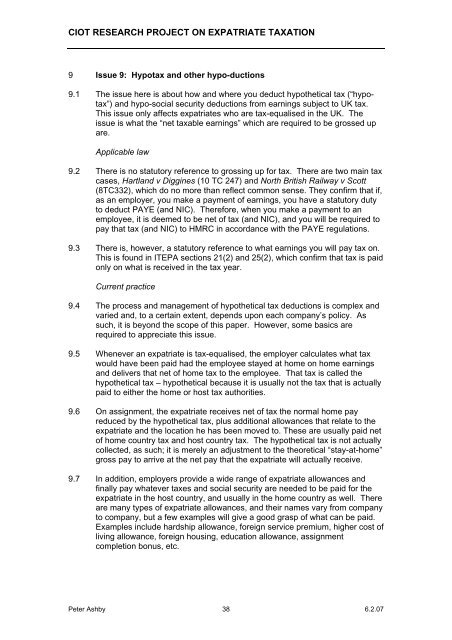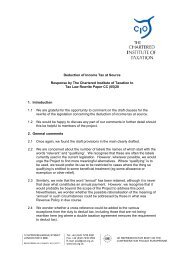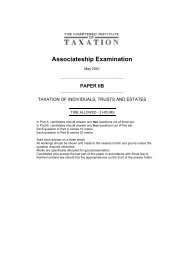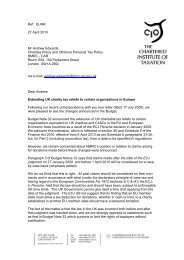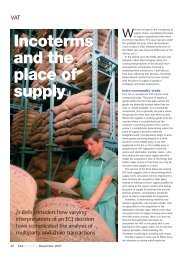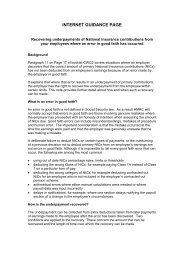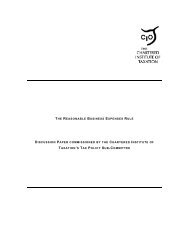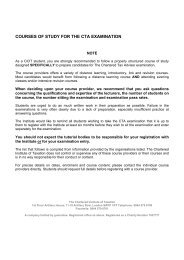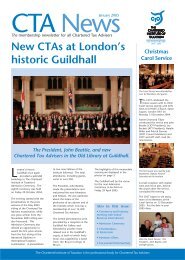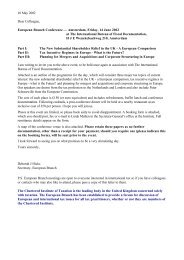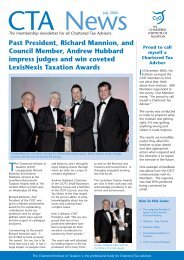Expatriate taxation - CIOT - The Chartered Institute of Taxation
Expatriate taxation - CIOT - The Chartered Institute of Taxation
Expatriate taxation - CIOT - The Chartered Institute of Taxation
You also want an ePaper? Increase the reach of your titles
YUMPU automatically turns print PDFs into web optimized ePapers that Google loves.
<strong>CIOT</strong> RESEARCH PROJECT ON EXPATRIATE TAXATION<br />
9 Issue 9: Hypotax and other hypo-ductions<br />
9.1 <strong>The</strong> issue here is about how and where you deduct hypothetical tax (“hypotax”)<br />
and hypo-social security deductions from earnings subject to UK tax.<br />
This issue only affects expatriates who are tax-equalised in the UK. <strong>The</strong><br />
issue is what the “net taxable earnings” which are required to be grossed up<br />
are.<br />
Applicable law<br />
9.2 <strong>The</strong>re is no statutory reference to grossing up for tax. <strong>The</strong>re are two main tax<br />
cases, Hartland v Diggines (10 TC 247) and North British Railway v Scott<br />
(8TC332), which do no more than reflect common sense. <strong>The</strong>y confirm that if,<br />
as an employer, you make a payment <strong>of</strong> earnings, you have a statutory duty<br />
to deduct PAYE (and NIC). <strong>The</strong>refore, when you make a payment to an<br />
employee, it is deemed to be net <strong>of</strong> tax (and NIC), and you will be required to<br />
pay that tax (and NIC) to HMRC in accordance with the PAYE regulations.<br />
9.3 <strong>The</strong>re is, however, a statutory reference to what earnings you will pay tax on.<br />
This is found in ITEPA sections 21(2) and 25(2), which confirm that tax is paid<br />
only on what is received in the tax year.<br />
Current practice<br />
9.4 <strong>The</strong> process and management <strong>of</strong> hypothetical tax deductions is complex and<br />
varied and, to a certain extent, depends upon each company’s policy. As<br />
such, it is beyond the scope <strong>of</strong> this paper. However, some basics are<br />
required to appreciate this issue.<br />
9.5 Whenever an expatriate is tax-equalised, the employer calculates what tax<br />
would have been paid had the employee stayed at home on home earnings<br />
and delivers that net <strong>of</strong> home tax to the employee. That tax is called the<br />
hypothetical tax – hypothetical because it is usually not the tax that is actually<br />
paid to either the home or host tax authorities.<br />
9.6 On assignment, the expatriate receives net <strong>of</strong> tax the normal home pay<br />
reduced by the hypothetical tax, plus additional allowances that relate to the<br />
expatriate and the location he has been moved to. <strong>The</strong>se are usually paid net<br />
<strong>of</strong> home country tax and host country tax. <strong>The</strong> hypothetical tax is not actually<br />
collected, as such; it is merely an adjustment to the theoretical “stay-at-home”<br />
gross pay to arrive at the net pay that the expatriate will actually receive.<br />
9.7 In addition, employers provide a wide range <strong>of</strong> expatriate allowances and<br />
finally pay whatever taxes and social security are needed to be paid for the<br />
expatriate in the host country, and usually in the home country as well. <strong>The</strong>re<br />
are many types <strong>of</strong> expatriate allowances, and their names vary from company<br />
to company, but a few examples will give a good grasp <strong>of</strong> what can be paid.<br />
Examples include hardship allowance, foreign service premium, higher cost <strong>of</strong><br />
living allowance, foreign housing, education allowance, assignment<br />
completion bonus, etc.<br />
Peter Ashby 38 6.2.07


